1849 Letter Mexican War Soldier To James W. Denver Ks Ca Co CIVIL War General
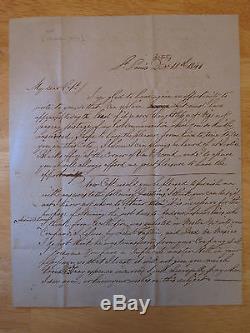
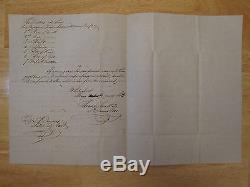
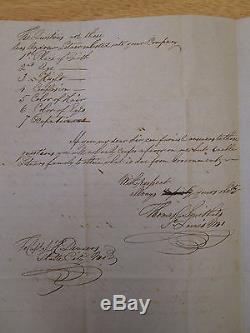
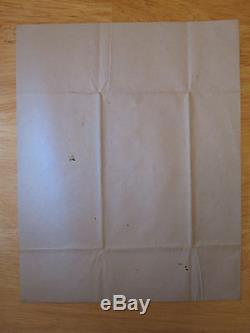
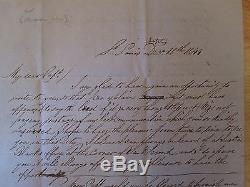
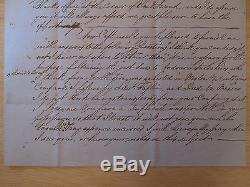
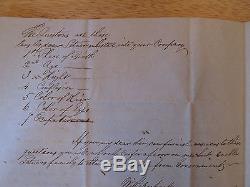
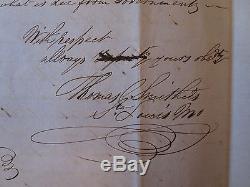
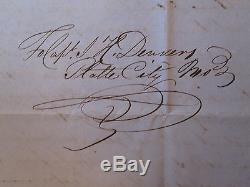
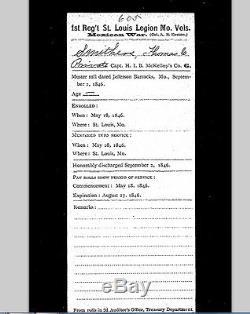

An original 1849 document measuring approximately 9 7/8 x 7 3/4 inches. Rank: Private Conflict: Mexican War Name of Unit: 1st Regiment St. He served in the California state government, as an officer in the United States Army in two wars, and as a Democratic member of the United States House of Representatives from California, as well as playing lead roles in local productions of Macbeth and Hamlet. He served as secretary and Governor of the Kansas Territory during the struggle over whether or not Kansas would be open to slavery.
The city of Denver, Colorado, is named after him. Denver was born near Winchester, Virginia. He attended public schools and moved to Ohio with his parents in 1830, settling near Wilmington. In 1841 he taught school in Missouri, and in 1844 he graduated from the law school of the University of Cincinnati.He was admitted to the bar and practiced law near Xenia, Ohio. He moved to Platte City, Missouri, in 1845, where he continued his law practice and acting career. In 1847, during the Mexican-American War, he recruited a company for the 12th U.
Volunteer Infantry and was commissioned a captain, serving under General Winfield Scott. After the war in 1850, Denver traveled to California, where he became a trader. Denver killed newspaper editor Edward Gilbert in a duel on August 2, 1852. Later that same year, he was elected to the California State Senate.He was later appointed as Secretary of State of California. In 1854 he was elected to the United States Congress as representative from California, serving from March 4, 1855 March 3, 1857. He was not a candidate for renomination in 1856. On April 17, 1857, President James Buchanan appointed him as Commissioner of Indian Affairs. On June 17, 1857, he resigned as Commissioner of Indian Affairs and was appointed by Buchanan as Secretary of the Kansas Territory.
In December 1857 he was appointed as Territorial Governor. On the day that Denver assumed the territorial governorship, citizens in the territory voted on the Lecompton Constitution, which opened the territory to slavery. The vote offered a choice only between full slavery and limited slavery in the territory and was thus largely boycotted by Free-Staters who were in favor of abolishing slavery. The pro-slavery constitution passed by an overwhelming margin. Later it was discovered that several thousand votes were cast fraudulently by "border ruffians" who had crossed into the territory from Missouri in order to cast pro-slavery ballots The vote was overturned by a subsequent election in August 1858, and Kansas was later admitted to the Union in 1861 as free state. See Bleeding Kansas for details. In November 1858, while Denver was still serving as territorial governor, William Larimer, Jr. A land speculator from Leavenworth, planted the townsite of "Denver City" along the South Platte River in Arapaho County in western Kansas Territory (the present-day state of Colorado). Larimer chose the name "Denver" to honor the current territorial governor with the intention that the city would be chosen as the county seat of Arapaho County. It was actually William McGaa and William Larimer who got the settlement of St. Charles at the confluence of Cherry Creek and the South Platte River to change its name to Denver in hope of becoming the county seat. Denver retired as territorial governor in November 1858 and was reappointed Commissioner of Indian Affairs, serving until his resignation on March 31, 1859.Civil War and later career[edit] A few months after the start of the American Civil War in early 1861, President Abraham Lincoln commissioned Denver a brigadier general in the volunteer army on August 14. During early 1862, Denver commanded the 3rd Brigade/5th Division under Maj. Sherman during the Siege of Corinth.
In November 1861, he was ordered to report to Fort Scott in Kansas. In December, he assumed command of all Federal troops in Kansas.
Denver subsequently served on garrison duty in that state until his resignation from the Union Army on March 5, 1863. After the end of the war, Denver practiced law in Washington, D. And Wilmington, Ohio; he and his family lived in the Rombach Place while residing in Wilmington. [1] He served as a delegate to Democratic National Convention in 1876, 1880, and 1884. He was mentioned as possible Democratic presidential nominee in 1876 and 1884, although his name was never offered into formal nomination. Denver reportedly visited Denver, Colorado in 1875 and 1882, but complained that his visits received little affection from the residents of the city named after him.[2] He died in Washington, D. In 1892 and is buried in Sugar Grove Cemetery in Wilmington, Ohio.
Congressman from Ohio from 19071913. Sellers: Add a FREE map to your listings. The item "1849 LETTER MEXICAN WAR SOLDIER TO JAMES W. DENVER KS CA CO CIVIL WAR GENERAL" is in sale since Wednesday, May 18, 2016.This item is in the category "Collectibles\Militaria\1784-1860\Original Period Items". The seller is "theprimitivefold" and is located in Oak Lawn, Illinois. This item can be shipped to United States, Canada, Australia, Thailand, Hong Kong, Mexico, Philippines, Norway, Qatar, Kuwait, Bahrain.

